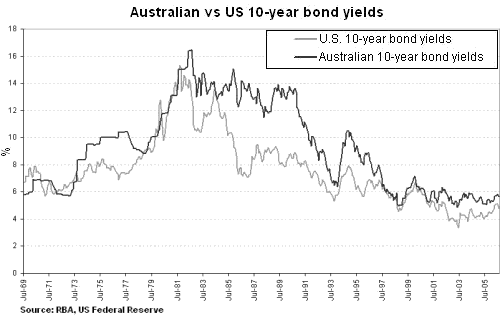The board of the Reserve Bank meets today just as the various football codes prepare for their respective final series.
Henry expects no news from the Bank tomorrow as it waits both for more international news - especially about the state of the US economy - and about the effects of rate hikes in May and August on the Australian economy.
The Bank's retiring Governor will be able to watch the footy finals with a mind unclouded by the need to ponder how many rate hikes will be needed here, a question his successor, Glenn Stevens, will be grappling with for the foreseeable future.
Advertisement
With credit growth still too high for comfort, unemployment at record lows and the housing market recovering in the southeast of Australia and out of control in the west, we expect that at least two more rate hikes will be needed, and quite possibly more.
The graph shows US and Australian bond yields. The traditional premium demanded of Australian yields was largely eliminated in recent years. But the main point of the graph is the recent rise in yields as global interest rates rise, although we acknowledge the very recent, and (we think) temporary, reduction.

The big economic news in the past month - leading to that temporary bond yield decline - has been signs of a slowing US economy and related easing of concerns about inflation. The US Fed led the way on August 8 with a pause in its hitherto relentless series of rate hikes.
Since their most recent peak in late June, yields on long bonds in the US have fallen more than 50 basis points from 5.25 per cent. China has also continued to tighten monetary policy and this seems to have weakened admittedly overly buoyant expectations in Japan and other Asian economies. Interest rates have also been raised in the past few months in Canada, Britain, Euroland, Thailand, Korea and Malaysia.
Weak economic data, particularly housing data, has validated the Fed's pause. Solid employment news on Friday night, however, has somewhat relieved current anxieties and one cannot be confident that there are no more US rate hikes to come.
Advertisement
Signs of slowing in the US economy and tightening of monetary policy elsewhere have gone with a substantial decline in the price of oil. From its peak on July 14 at almost $US78 per barrel, the price of oil has declined to $US70. This is partly due to perceptions of weakening demand, but also because of some lessening of geopolitical tension.
Henry was gobsmacked when the Hezbollah leader announced on global TV that if he had known how Israel would react, he would not have kidnapped their soldiers. This has been variously interpreted as acknowledgment that Israel won the war, to a saner analysis that there were only losers in this conflict.
This was a battle by proxy between the United States and Hezbollah's supporters and sponsors Iran and Syria.
First published in The Australian on September 5, 2006 and on Henry Thornton's website.
Discuss in our Forums
See what other readers are saying about this article!
Click here to read & post comments.